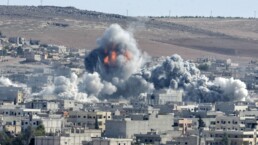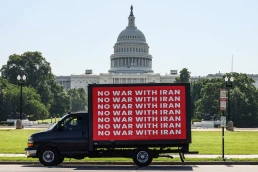Israeli attacks on Lebanon have long been linked to violence in Gaza — that’s why a ceasefire is key to resolving both conflicts.
By Khury Petersen-Smith, Foreign Policy in Focus
As of this writing, Israel’s rampage in Lebanon has killed more than a thousand people in two weeks, wounded thousands more (including many maimed for life), and displaced hundreds of thousands.
The Israeli onslaught — including the assassination of Hezbollah leader Hassan Nasrallah with a 2,000 pound, U.S.-made bomb that killed others too — has mostly garnered approval from American leaders, particularly the president and vice president.
Continuing its genocidal assault of Gaza, bombing Yemen for the second time this year, and carrying out aerial bombardment in Lebanon at a speed and on a scale perhaps unseen in the 21st century, Israel has been making plans to launch a ground invasion. As the invasions and attacks escalate and expand across the region — and Washington continues to send Israel weapons — here are six key things to know about the crisis in Lebanon and how it could be resolved.

1. Israel has a long history of attacks on Lebanon.
In 1982, at the height of Lebanon’s catastrophic, 15 year civil war, Israeli forces invaded, attacking Lebanese villages and Palestinian refugee camps with tanks, airstrikes, and shells.
Israel laid siege to Beirut and collaborated with far-right Christian Lebanese militias as they carried out a notorious massacre of Palestinian refugees in Sabra and the Shatilla refugee camp, killing thousands.
It was during these years that Hezbollah formed to fight the Israeli occupation.
2. Israel occupied Lebanon for 15 years.
Israel occupied a wide strip of Southern Lebanon from 1985 until 2000.
During that time, the Israeli military propped up the South Lebanon Army (SLA) militia, which detained Lebanese and Palestinian dissidents at a notorious prison — administered under Israeli protection — where Amnesty International and other human rights organizations documented systematic torture.
Israel justified its brutal occupation by claiming it needed a “buffer zone” to protect itself — the same excuse it is using to justify its attacks in southern Lebanon today.
Recent Posts
A War With Iran Would Not Be a One-Off Event But a Disastrous Ongoing Rupture
February 26, 2026
Take Action Now If Congress cedes its power to stop a war with Iran, it will fully erode any lingering promise of democratic restraint.By Hanieh…
New Addition to List of Nuclear Near Catastrophes
February 25, 2026
Take Action Now Debris flew for great distances — many times the distance of 270 meters to a nuclear reactor and nuclear storage facility.By David…
Gavin Newsom’s last budget belies his ‘California for All’ pledge
February 24, 2026
Take Action Now Yet, even as the state is poised to lose billions in federal funding, and millions of Californians are losing access to health care…
Israel and American Hawks are Pushing U.S. to Iran War With Catastrophic Consequences
February 23, 2026
Take Action Now At the World Health Assembly in May, member states may endorse an unprecedented strategy declaring that health is not a cost – but…




